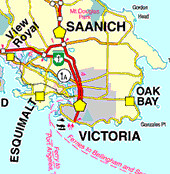If you live in greater Victoria, you must be aware that BC Transit and CAW Local 333 are negotiating a new contract. Like a number of contracts negotiated in this time of fake austerity, the negotiation is contentious because there are actual mandates from the government that salaries cannot increase unless “savings” are found elsewhere. I am not privy to how these negotiations are going, so no second guessing here on strategy or tactics. I hope things get settled, because I travel more than a thousand kilometres by bus every month and driving to work is not what I want to do, neither is crossing a picket line.
All that being said, this new tack is disturbing.
Williams said B.C. Transit “wants the unrestricted right to bring in Chinese-built” community shuttle buses with lower safety standards, which could be piloted by part-time drivers “at a significantly lower wage rate than conventional bus drivers.”“B.C. Transit literally had to go to China and get these buses designed and built there to get around higher safety requirements,” Williams said in the release.
via Victoria bus drivers set for overtime work ban starting Monday, union says
Yes, China bashing is a quick way to gain sympathy. and happening quite a bit this month because the Chinese and Canadian governments are negotiating a secret trade agreement (Leadnow campaign link) that gives corporations of both countries all kinds of rights and privileges that we could only dream of getting for ourselves.
Is there any evidence that Chinese made buses are unsafe, especially when they need to conform to Canadian safety standards? Is there any evidence that these standards are being gamed? These are different questions from “are these buses suitable”? “Are the lifecycle costs for these buses being understated”? I wish CAW Local 333 would take the time to frame this issue more accurately, because this issue is not about China, it is about us.
Lost in all this China bashing and a cynical attempt to appeal to our “other” phobia is the obvious conclusion that it’s not the “made in China” aspect of manufacturing that makes a product less durable or of poorer quality, it is the insistence of markets to lower standards on the products to cut short-term costs or to increase profits. China, like many other countries, probably more than Canada, manufactures large quantities of high quality products routinely. It’s not China’s fault that your crappy London Drugs coffee grinder can’t actually grind coffee and breaks when your cat sneezes near it. It’s the fault of the companies that sell you stuff, and our own inability to balance short-term price vs. long term cost. It is also the oppressiveness of the Chinese government combined with consumers need for cheap, and market profit needs that exacts a high price on the Chinese makers of the high quality IPhone.
So, ask hard questions about the suitability of the buses, and question the market mechanisms that brought us here. Unions are a very necessary buffer against market excess and corporate control. But do we have to use “made in China” as a cudgel again? As my friend says,
Made in China has become a short form for criticisms of the market, which are credible. But the problem is that it slips in the othering too


I looked at the schedule, the Douglas bus lanes may only saw two minutes
http://www.blogger.com/blogger.g?blogID=22657184#allposts
Opps, wrong link
http://victoriavision.blogspot.ca/2012/09/some-sanity-in-victoria-transit.html
Bernard:
I think the schedule showing a difference of only 2-3 minutes between off-peak and peak travel is reasonable for that distance. As an almost daily, long distance transit user, a 10% improvement is significant. Also, the idea that I get on a separate bus lane and speed into town predictably, and on time are important psychological boosts. Sometimes, little things at the margin make a difference. For example, the 70 turns left on to Douglas from Hillside, and at peak times, it can stay a while because only one bus can turn per light. Small improvements like making the bus priority lights and turns work (such a misstep by BC Transit to screw up those bus priority lights on the Transcanada) make a big difference in perceived and real quality.
I think the big benefits come if the BRT-Lite can be extended on the highway, which is going to be challenging. But, without Victoria pressuring the provincial government by signalling that it is putting transit first, nothing will happen. The current provincial government has lost the ability to lead on transit (if it ever had it in the first place).
In the long run, many people won’t really take transit more unless gas prices and car hassles increase, which is not something the governments will want to voluntarily impose.
I agree, the real time bottleneck is on the highway, but even then the difference between mid day and max peak time is only 9 minutes though that is almost a 20% increase in the time. It is the act of sitting and not moving that makes people get frustrated and the length of time is not really the issue.
In Victoria we do not have a lot of long commutes so in absolute terms the time improvements will never look good. Meanwhile in Vancouver the 99Bline was a huge improvement over the #9 Boradway bus.
I think BC Transit should look at making the whole #14 and #26 routes into Blines – limited stops with realtime updates at the stops about when the next bus will arrive and the ability to enter and exit at any door without having to show a pass or ticket. Faster passenger pick up and drop off would make a major difference.
I meant to add, I do not think it is fair to crap on the current government about transit, they have been decent. Kelowna has a BLine like service. Vancouver has the Canada Line and a number of new transit systems have started in the last 12 years.